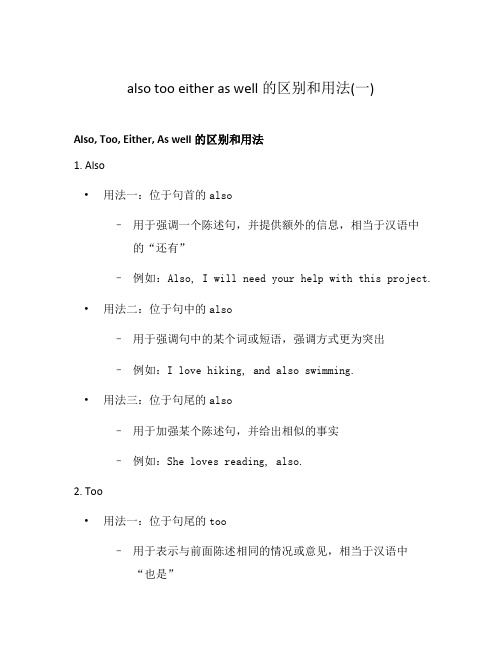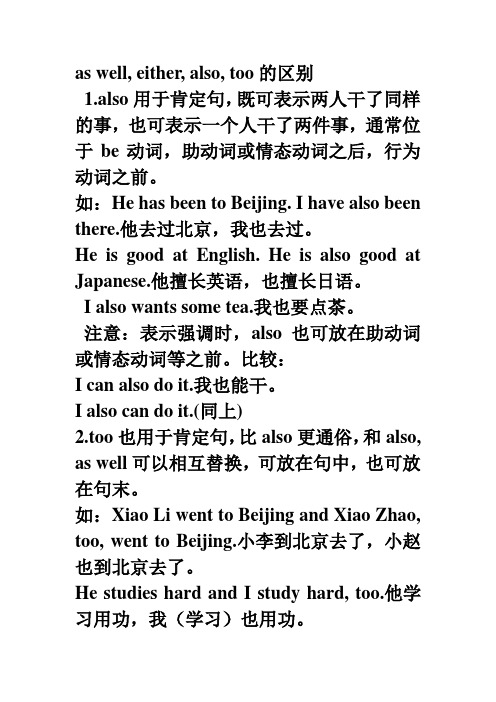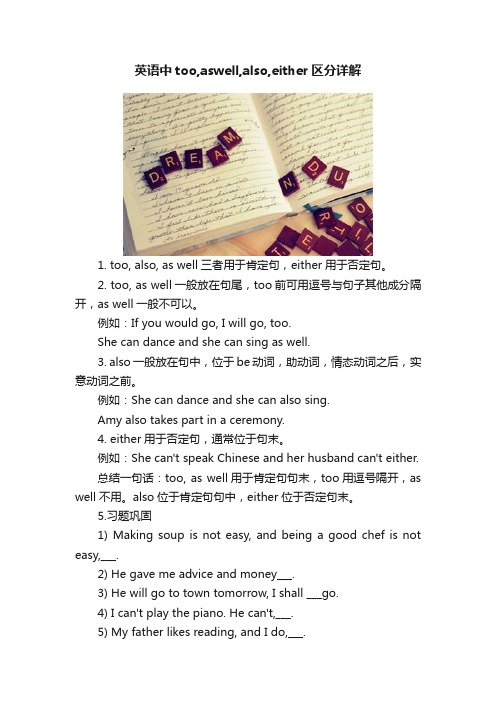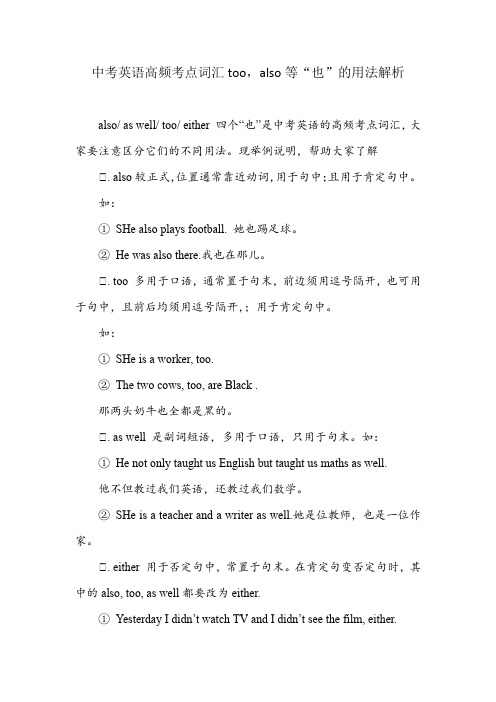九年级英语also, too, either, as well的区别
also too either as well的区别和用法

also too either as well的区别和用法(实用版)目录1.引言2.also, too, either 和 as well 的含义和用法的区别3.also 和 too 的用法4.either 的用法5.as well 的用法6.总结正文一、引言在英语中,副词"also", "too", "either"和"as well"经常被用来表示不同的意思。
尽管它们在某些情况下可以互换使用,但它们之间仍然存在一些关键的差异。
在本文中,我们将详细讨论这些差异以及如何正确使用这些副词。
二、also, too, either 和 as well 的含义和用法的区别1.also:也,用于表示某个观点或行为也适用于另一个观点或行为。
例句:I like apples and I also like oranges.(我喜欢苹果,我也喜欢橙子。
)2.too:也,用于表示强调,通常放在句尾。
例句:I am very tired, too.(我也非常累。
)3.either:(两者之中)任何一个,用于表示两者之间的选择。
例句:You can choose either a book or a magazine.(你可以选择一本书或一份杂志。
)4.as well:也,用于表示某个观点或行为同样适用于另一个观点或行为。
通常放在句尾。
例句:She is a great dancer and a great singer as well.(她是一名优秀的舞者,同时也是一名优秀的歌手。
)三、also 和 too 的用法1.also:用于句中,表示两个观点或行为之间的联系。
例句:He is a talented artist and he also plays the piano.(他是一名有才华的艺术家,而且他也会弹钢琴。
)2.too:用于句尾,表示强调。
Too,also,aswell,either区别1

Too, also, as well, either区别答:too, also, either, as well.这些“也”到底有什么区别呢?我们来看看下面的句子就明白了。
1) too放在句子末尾,通常用逗号隔开。
e.g: I am a student, too.我也是一名学生。
2)either在否定句中使用,但是放在句子末尾,通常用逗号隔开。
e.g: Lucy doesn’t go to the party, either.露西也没有去参加派对。
3) also则放在系动词be之后,实义动词之前。
e.g: I am also a student.我也是一名学生。
Li Ming also takes part in a ceremony.李明也参加了仪式。
4) as well 用在肯定句中,放在句子末尾。
e.g: Tony speaks Japanese as well.托尼也会说日语。
再举个例子:She has knowledge and experience as well.她既有知识,又有经验。
总之,too是肯定句中的“也”,either则是否定句中的“也”,放的位置都在句子末尾;also则是放在句中的“也”;aswell是放在句末的“也”。
【牛刀小试】根据汉语意思完成下面的句子(每空词数不限):1. She speaks French and German and a little Russian.2. I’ve read the book and I’ve seen the film, .3. Mary didn’t go there yesterday, and I didn’t go there, .4. He is going to London and his sister is going .【启发点拨】as well,also,too和either都可表示“也”,它们各自的用法如下:(1) as well常用于肯定句中,且位于句末;(2) also用于肯定句中,通常位于句中;(3) too用于肯定句中,通常位于句末,常用逗号和前面的部分隔开;(4) either多用于否定句中,常位于句末。
also too either as well的区别和用法(一)

also too either as well的区别和用法(一)Also, Too, Either, As well的区别和用法1. Also•用法一:位于句首的also–用于强调一个陈述句,并提供额外的信息,相当于汉语中的“还有”–例如:Also, I will need your help with this project. •用法二:位于句中的also–用于强调句中的某个词或短语,强调方式更为突出–例如:I love hiking, and also swimming.•用法三:位于句尾的also–用于加强某个陈述句,并给出相似的事实–例如:She loves reading, also.2. Too•用法一:位于句尾的too–用于表示与前面陈述相同的情况或意见,相当于汉语中“也是”–例如:I am tired, too.•用法二:位于句中的too–用于强调句中某人或某物和其他人或物一样–例如:He, too, has a dog.3. Either•用法一:位于句尾的either–用于在否定句中表示两种选择中的任何一种–例如:I don’t like tea, either.•用法二:either…or…–用于表示两种选择之间的关系,相当于汉语中的“要么…要么…”–例如:You can either study or play games.4. As well•用法一:位于句尾的as well–用于表示除了前面提到的情况之外,还有另外一项–例如:I like cooking and gardening as well.•用法二:as well as–用于列举一系列事物时,表示“还有…以及…”–例如:He is good at playing soccer as well asbasketball.以上是also, too, either, as well的常见用法及区别。
通过合理运用这些词语,可以使你的表达更加准确明确。
also, too, either, as well的区别

also, too, either, as well的区别这四个副词均可表示“也”,区别如下:1.too 和as well 多用于口语中,语气较轻,通常用于肯定句或疑问句,一般不用于否定句,且通常放在句末。
如:I like you too [as well]. 我也喜欢你。
Are they coming too [as well]? 他们也来吗?too 有时也紧跟在主语后(注:as well 不这样用),此用法较正式。
如:I, too, know where he lives. 我也知道他住在什么地方。
在Me too, You too 这类简略答语中,通常不用as well, also。
如:A:I’m tired. 我累了。
B:Me too. 我也是。
as well意为“也,又,而且”,意思等同于too,also,但as well只能置于句末。
He speaks English and Spanish as well.他既能说英语, 也能说西班牙语。
There may be travel expense, as well.可能还有旅途费用。
Are they coming as well?他们也来吗?as well也, 还有He speaks English and Spanish as well.他既能说英语, 也能说西班牙语。
2.also 比too 和as well 正式,一般也不用于否定句,它在句中的位置通常是紧靠动词,即放在行为动词之前,特殊动词之后。
有时为了强调也放在句末(但不常见)。
如:He also came. / He came also. 他也来了。
She is young and beautiful,and also rich. 她年轻漂亮,而且有钱。
also 有时用于句首(其后通常有逗号),相当于连词and。
如:Also,his mother was dead. 再说,他母亲又过世了。
as well,either,also,too的区别doc

as well, either, also, too的区别1.also用于肯定句,既可表示两人干了同样的事,也可表示一个人干了两件事,通常位于be动词,助动词或情态动词之后,行为动词之前。
如:He has been to Beijing. I have also been there.他去过北京,我也去过。
He is good at English. He is also good at Japanese.他擅长英语,也擅长日语。
I also wants some tea.我也要点茶。
注意:表示强调时,also也可放在助动词或情态动词等之前。
比较:I can also do it.我也能干。
I also can do it.(同上)2.too也用于肯定句,比also更通俗,和also, as well可以相互替换,可放在句中,也可放在句末。
如:Xiao Li went to Beijing and Xiao Zhao, too, went to Beijing.小李到北京去了,小赵也到北京去了。
He studies hard and I study hard, too.他学习用功,我(学习)也用功。
3.either用于否定句,而且只能放在句末。
如:He didn’t know it. I didn’t know it either.他不知道那件事,我也不知道。
I can’t speak French and can’t write it, either.我不会讲法语,也不会写法语。
4.as well在口语中用得很多,用法和too完全一样,可以互换,通常位于句末。
如:She not only sings, she plays the piano as well.她不但会唱歌,而且会弹钢琴。
I can do it as well.这事我也能做。
英语中too,aswell,also,either区分详解

英语中too,aswell,also,either区分详解1. too, also, as well三者用于肯定句,either用于否定句。
2. too, as well一般放在句尾,too前可用逗号与句子其他成分隔开,as well一般不可以。
例如:If you would go, I will go, too.She can dance and she can sing as well.3. also一般放在句中,位于be动词,助动词,情态动词之后,实意动词之前。
例如:She can dance and she can also sing.Amy also takes part in a ceremony.4. either用于否定句,通常位于句末。
例如:She can't speak Chinese and her husband can't either.总结一句话:too, as well用于肯定句句末,too用逗号隔开,as well不用。
also位于肯定句句中,either位于否定句末。
5.习题巩固1) Making soup is not easy, and being a good chef is not easy,___.2) He gave me advice and money___.3) He will go to town tomorrow, I shall ___go.4) I can't play the piano. He can't,___.5) My father likes reading, and I do,___.答案:1.either 2. as well 3. also 4. either 5. too。
(最新整理)also,too,aswell,either的区别、用法及练习题(附答案)

also,too,aswell,either的区别、用法及练习题(附答案)编辑整理:尊敬的读者朋友们:这里是精品文档编辑中心,本文档内容是由我和我的同事精心编辑整理后发布的,发布之前我们对文中内容进行仔细校对,但是难免会有疏漏的地方,但是任然希望(also,too,aswell,either的区别、用法及练习题(附答案))的内容能够给您的工作和学习带来便利。
同时也真诚的希望收到您的建议和反馈,这将是我们进步的源泉,前进的动力。
本文可编辑可修改,如果觉得对您有帮助请收藏以便随时查阅,最后祝您生活愉快业绩进步,以下为also,too,aswell,either的区别、用法及练习题(附答案)的全部内容。
also, too, as well, either 的区别、用法及练习题1.also , 用于肯定句中,表示“也”的意思。
如:Jane speaks French 。
Sam also speaks French 。
He loves chocolate. I also love pizza 。
Frank can come with us 。
Nancy can also come with us.also 在句子中的位置,主要有四种情况:(1) 放在be 动词之后。
如:I am also Canadian.I was also there 。
(2) 放在实义(行为)动词之前.如:I also sing 。
He also helped us 。
(3) 放在助动词、情态动词之后。
如:I have also been to Hong Kong.I am also studying economics.I can also speak French.I should also be there 。
(4) 放在句首,用逗号隔开,表示强调。
如:It’s very humid 。
Also , you can easily get sunburnt.It is a small house 。
(最新整理)also,too,aswell,either的区别、用法及练习题(附答案)

also,too,aswell,either的区别、用法及练习题(附答案)编辑整理:尊敬的读者朋友们:这里是精品文档编辑中心,本文档内容是由我和我的同事精心编辑整理后发布的,发布之前我们对文中内容进行仔细校对,但是难免会有疏漏的地方,但是任然希望(also,too,aswell,either的区别、用法及练习题(附答案))的内容能够给您的工作和学习带来便利。
同时也真诚的希望收到您的建议和反馈,这将是我们进步的源泉,前进的动力。
本文可编辑可修改,如果觉得对您有帮助请收藏以便随时查阅,最后祝您生活愉快业绩进步,以下为also,too,aswell,either的区别、用法及练习题(附答案)的全部内容。
also, too, as well, either 的区别、用法及练习题1.also , 用于肯定句中,表示“也”的意思。
如:Jane speaks French 。
Sam also speaks French 。
He loves chocolate. I also love pizza 。
Frank can come with us 。
Nancy can also come with us.also 在句子中的位置,主要有四种情况:(1) 放在be 动词之后。
如:I am also Canadian.I was also there 。
(2) 放在实义(行为)动词之前.如:I also sing 。
He also helped us 。
(3) 放在助动词、情态动词之后。
如:I have also been to Hong Kong.I am also studying economics.I can also speak French.I should also be there 。
(4) 放在句首,用逗号隔开,表示强调。
如:It’s very humid 。
Also , you can easily get sunburnt.It is a small house 。
also, too, either, as well的区别

also, too, either, as well的区别这四个副词均可表示“也”,区别如下:1.too 和as well 多用于口语中,语气较轻,通常用于肯定句或疑问句,一般不用于否定句,且通常放在句末。
如:I like you too [as well]. 我也喜欢你。
Are they coming too [as well]? 他们也来吗?too 有时也紧跟在主语后(注:a s well 不这样用),此用法较正式。
如:I, too, know where he lives. 我也知道他住在什么地方。
在Me too, You too 这类简略答语中,通常不用as well, also。
如:A:I’m tired. 我累了。
B:M e too. 我也是。
2.also 比too 和as well 正式,一般也不用于否定句,它在句中的位置通常是紧靠动词,即放在行为动词之前,特殊动词之后。
有时为了强调也放在句末(但不常见)。
如:He also came. / He came also. 他也来了。
She is young and beautiful,a nd also rich. 她年轻漂亮,而且有钱。
also 有时用于句首(其后通常有逗号),相当于连词and。
如:Also,h is mother was dead. 再说,他母亲又过世了。
3.either(也)通常只用于否定句,且要放在句末。
如:I don’t know, either. 我也不知道。
He hasn’t finished it,e ither.他也还没有做完。
注:有时在肯定句之后跟一个否定句,可能用too,a lso。
如:He came, but she didn’t also came. 他来了,但她没有也一起来。
He went to Washington, but not to New York too. 他去了华盛顿,但并不是也去了纽约。
also too either as well的区别和用法

also too either as well的区别和用法摘要:1.介绍also, too, either 和as well 的含义和用法2.区分also, too, either 和as well 之间的差异3.提供实例说明这些词的用法4.总结这些词的用法和注意事项正文:一、also, too, either 和as well 的含义和用法1.also:用于肯定句中,表示“也”,“同样”2.too:用于肯定句中,表示“也”,“同样”3.either:用于否定句和疑问句中,表示“也不”,“任何一个”4.as well:用于肯定句和否定句中,表示“也”,“同样”二、区分also, too, either 和as well 之间的差异1.also 和too 的用法相似,都表示“也”,“同样”,但是also 用于较为正式的场合,而too 更常用于口语中。
2.either 用于否定句和疑问句中,表示“也不”,“任何一个”,而also 和too 只能用于肯定句中。
3.as well 用于肯定句和否定句中,表示“也”,“同样”,与also 和too 的用法类似,但是as well 可以放在句首、句中和句末。
三、实例说明这些词的用法1.also 的用法:I like apples and oranges.I also like bananas.(我也喜欢香蕉。
)2.too 的用法:She likes apples and oranges.She also likes bananas.(她也喜欢香蕉。
)3.either 的用法:I don"t like apples.I don"t like oranges either.(我也不喜欢橙子。
)4.as well 的用法:I like apples, oranges, and bananas as well.(我也喜欢香蕉。
)四、总结这些词的用法和注意事项1.also, too 和as well 的用法相似,都表示“也”,“同样”,但是它们在不同语境下的使用频率和场合有所不同。
简析also__too__as_well和either用法

简析also, too, as well和either用法also, too, as well, either,作“也”讲,为副词。
下面分别讲述:一. too, also, as well:都用于肯定句,表示前者怎样后者也怎样。
too:一般放在句尾,可用逗号和前面的句子隔开,也可不用;also:其位置大多放在be动词、助动词、情态动词之后,实义动词之前;as well:其位置一般放在句尾,三者可以作同义句转换。
例如:You need to go shopping and I need to go shopping, too.=You need to go shopping and I also need to go shopping.=You need to go shopping and I need to go shopping as well.二. either:用于否定句中,表示前者不……,后者也不……,其位置一般放在句尾。
例如:He doesn’t want any coffee, and I don’t want any, either.You don’t know the way and I don’t know it, either.[巩固训练]选择正确答案:1. He is ___________________ saying, “I don’t want any bread, ___________________.”A. too, alsoB. also, tooC. either, tooD. also, either2. I _________________ study English and Russian.A. tooB. alsoC. eitherD. as well3. Not only the children but ________________ their father is in town.A. tooB. alsoC. eitherD. as well4. John _____________ believes that bears hibernate in winter ________________.A. also, eitherB. too, as wellC. also, as wellD. as well, too5. The foreigner can speak English, he can speak French __________________.A. neitherB. alsoC. eitherD. as well【参考答案】1. D2. B3. B4. C5. D。
also, too, either和as well的区别

also, too, either和as well的区别He bought a computer,but she didn’t,.A.EitherB.TooC.Also(“他也买了电脑,但她没有也买电脑”,你选哪个答案?)下面这个句子要表达“他也买了一台电脑,但是她没有也买一台”这个意思,句中的两个“也”分别该用哪一个词,你能准确地选择出来吗?He _____ bought a computer, but she didn't, _____.A. eitherB. tooC. alsoD. as well我敢保证,90%以上的同学上面的第二空会选错,因为你会选A!那你当然就错了。
also, too, either 和as well这四个词都有“也”的意思,它们的区别在于:1. too 和as well 多用于口语中,语气较轻,通常用于肯定句或疑问句,一般不用于否定句,且通常放在句末。
如:(1)I like you too.(= like you as well.)我也喜欢你。
(肯定句)(2)Are they coming too?(=Are they coming as well?)他们也来吗?(疑问句)2、too放在句末时,too前面可以加上逗号,也可以不加逗号,但as well前面不加逗号。
如:(1)I like you, too. 我也喜欢你。
(正确)(2)I like you, as well. 我也喜欢你。
(错误)3、too有时也紧跟在主语后,这时它的前后都会用逗号与原句隔开,也就是说,too是作为一个插入语放在主语后面的,此用法较正式。
但as well不能这样使用。
如:I, too, know where he lives. 我也知道他住在什么地方。
中考英语高频考点词汇too,also等“也”的用法解析

中考英语高频考点词汇too,also等“也”的用法解析
also/ as well/ too/ either 四个“也”是中考英语的高频考点词汇,大家要注意区分它们的不同用法。
现举例说明,帮助大家了解Ⅰ. also较正式,位置通常靠近动词,用于句中;且用于肯定句中。
如:
①SHe also plays football. 她也踢足球。
②He was also there.我也在那儿。
Ⅰ. too 多用于口语,通常置于句末,前边须用逗号隔开,也可用于句中,且前后均须用逗号隔开,;用于肯定句中。
如:
①SHe is a worker, too.
②The two cows, too, are Black .
那两头奶牛也全都是黑的。
Ⅰ. as well 是副词短语,多用于口语,只用于句末。
如:
①He not only taught us English but taught us maths as well.
他不但教过我们英语,还教过我们数学。
②SHe is a teacher and a writer as well.她是位教师,也是一位作家。
Ⅰ. either 用于否定句中,常置于句末。
在肯定句变否定句时,其中的also, too, as well都要改为either.
①Yesterday I didn’t watch TV and I didn’t see the film, either.
昨天我没有看电视,也没有看电影。
also, too, as well, either的区别、用法及练习题(附答案)

also, too, as well, either的区别、用法及练习题1.also, 用于肯定句中,表示“也”的意思。
如:Jane speaks French. Sam also speaks French.He loves chocolate. I also love pizza.Frank can come with us. Nancy can also come with us.also在句子中的位置,主要有四种情况:(1) 放在be动词之后。
如:I am also Canadian.I was also there.(2) 放在实义(行为)动词之前。
如:I also sing.He also helped us.(3) 放在助动词、情态动词之后。
如:I have also been to Hong Kong.I am also studying economics.I can also speak French.I should also be there.(4) 放在句首,用逗号隔开,表示强调。
如:It’s very humid. Also, you can easily get sunburnt.It is a small house. Also, it needs a lot of repairs.2.too, 用于肯定句中,表示“也”的意思。
如:Jane speaks French. Sam speaks French too.I love chocolate. I love pizza too.Frank can come with us. Nancy can come with us too.too, 在句子中的位置,主要有两种情况。
如:(1)放在句子末尾,可以用逗号隔开,也可以不用逗号隔开。
如:David is a teacher. His wife is a teacher, too. (用逗号隔开)David is a teacher. His wife is a teacher too. (不用逗号隔开)I can speak French too.I am studying economics too.If he wants to go too, he should meet us at 8:00.(2)插入句子中。
英语中表示也的单词

英语中表示也的单词
英语中表示也的单词和词组有:too,also,either,as well as
一.too, also, as well:都用于肯定句,表示前者怎样后者也怎样。
1,too:一般放在句尾,可用逗号和前面的句子隔开,也可不用;2, also:其位置大多放在be动词、助动词、情态动词之后,实义动词之前;
3,as well:其位置一般放在句尾,三者可以作同义句转换。
例如: You need to go shopping and I need to go shopping, too. =You need to go shopping and I also need to go shopping.
=You need to go shopping and I need to go shopping as well. My father is a teacher,My mother is a teacher,too.
=My father is a teacher,My mother is also a teacher.
=My father is a teacher,My mother is a teacher as well.
4,either:用于否定句中,表示前者不……,后者也不……,其位置一般放在句尾。
例如:
He doesn”t want any coffee, and I don”t want any, either. You don”t know the way and I don”t know it, either
I can’t speak French,Jenny can’t speak French,eigher.。
also--too--as-well--either的区别、用法及练习题(附答案)

also,too, as well,either的区别、用法及练习题1.also,用于肯定句中,表示“也"的意思。
如:Jane speaks French. Sam also speaks French。
He loves chocolate. I also love pizza.Frank can come with us. Nancy can also come with us.also在句子中的位置,主要有四种情况:(1) 放在be动词之后。
如:I am also Canadian。
I was also there。
(2) 放在实义(行为)动词之前。
如:I also sing。
He also helped us。
(3) 放在助动词、情态动词之后.如:I have also been to Hong Kong.I am also studying economics。
I can also speak French。
I should also be there.(4) 放在句首,用逗号隔开,表示强调。
如:It’s very humid. Also, you can easily get sunburnt.It is a small house。
Also,it needs a lot of repairs.2.too,用于肯定句中,表示“也”的意思。
如:Jane speaks French。
Sam speaks French too。
I love chocolate。
I love pizza too.Frank can come with us。
Nancy can come with us too。
too, 在句子中的位置,主要有两种情况。
如:(1)放在句子末尾,可以用逗号隔开,也可以不用逗号隔开.如:David is a teacher。
His wife is a teacher, too. (用逗号隔开)David is a teacher。
如何区别also, too, either与as well

如何区别also, too, either与as well(最新版)编制人:__________________审核人:__________________审批人:__________________编制单位:__________________编制时间:____年____月____日序言下载提示:该文档是本店铺精心编制而成的,希望大家下载后,能够帮助大家解决实际问题。
文档下载后可定制修改,请根据实际需要进行调整和使用,谢谢!并且,本店铺为大家提供各种类型的经典范文,如词性大全、句法大全、句型大全、从句大全、时态大全、语态大全、语法大全、虚拟语气、用法辨析、其他资料等等,想了解不同范文格式和写法,敬请关注!Download tips: This document is carefully compiled by this editor.I hope that after you download it, it can help you solve practical problems. The document can be customized and modified after downloading, please adjust and use it according to actual needs, thank you!In addition, this shop provides you with various types of classic sample essays, such as part of speech, syntax, sentence pattern, clause, tense, voice, grammar, subjunctive, usage analysis, other materials, etc. If you want to know the different formats and writing methods of the model essay, please pay attention!如何区别also, too, either与as wellalso, too, either与as well 均可表示“也”,用法及其区别分述如下:1. too 和 as well两者多用于口语中,语气较轻,通常用于肯定句或疑问句,一般不用于否定句,且通常放在句末。
also-too-as-well-either的区别、用法及练习题(附答案)

also, too, as well, either的区别、用法及练习题1.also, 用于肯定句中,表示“也”的意思。
如:Jane speaks French. Sam also speaks French.He loves chocolate. I also love pizza.Frank can come with us. Nancy can also come with us.also在句子中的位置,主要有四种情况:(1) 放在be动词之后。
如:I am also Canadian.I was also there.(2) 放在实义(行为)动词之前。
如:I also sing.He also helped us.(3) 放在助动词、情态动词之后。
如:I have also been to Hong Kong.I am also studying economics.I can also speak French.I should also be there.(4) 放在句首,用逗号隔开,表示强调。
如:It’s very humid. Also, you can easily get sunburnt.It is a small house. Also, it needs a lot of repairs.2.too, 用于肯定句中,表示“也”的意思。
如:Jane speaks French. Sam speaks French too.I love chocolate. I love pizza too.Frank can come with us. Nancy can come with us too.too, 在句子中的位置,主要有两种情况。
如:(1)放在句子末尾,可以用逗号隔开,也可以不用逗号隔开。
如:David is a teacher. His wife is a teacher, too. (用逗号隔开)David is a teacher. His wife is a teacher too. (不用逗号隔开)I can speak French too.I am studying economics too.If he wants to go too, he should meet us at 8:00.(2)插入句子中。
四个单词英译都是“也”用法大不同

四个单词英译都是“也”用法大不同四个单词英译都是“也” 用法大不同耀华中学陈茹在初中英语中有四个副词——too,either,also,so和一个词组as well,它们都可以用来表示“也”的意思。
我们来看一看它们的分工吧:1.too:具有肯定意义,当相邻的两个肯定句所叙述的事实相同时,后句末尾常用too表示“(后者)也……”。
如:Jim likes red. I like red, too.吉姆喜欢红色,我也喜欢。
You may have a try, too.你也可以试一试。
2.either:在否定句中,常用either表示“(后者)也(不)……”。
如:If he doesn't go, I won't either.如果他不去,我也不去。
It won't do them any good, but it won't do them any harm either.这对他们没什么好处,但也没有什么害处。
3.also:含较庄重色彩,通常用于主要动词之前,但若主要动词是be,则置于其后。
如:They also agree with me.他们也同意我的意见。
I was also there.我也在那儿。
4.as well:常用于句末,意为“也;还”。
如:He speaks English, and he knows French as well.他说英语,也懂法语。
5.so:用于代替上文中的形容词、名词或动词,当一句话说完之后,接着一句用倒装结构,表示“(后者)也……”。
如:Mary is very happy and so is everyone else in her birthday party.在玛莉的生日宴会上,她非常高兴,其他人也非常愉快。
- 1、下载文档前请自行甄别文档内容的完整性,平台不提供额外的编辑、内容补充、找答案等附加服务。
- 2、"仅部分预览"的文档,不可在线预览部分如存在完整性等问题,可反馈申请退款(可完整预览的文档不适用该条件!)。
- 3、如文档侵犯您的权益,请联系客服反馈,我们会尽快为您处理(人工客服工作时间:9:00-18:30)。
这四个副词均可表示“也”,区别如下:
1. too 和as well 多用于口语中,语气较轻,通常用于肯定句或疑问句,一般不用于否定句,且通常放在句末。
如:
I like you too [as well].
我也喜欢你。
Are they coming too [as well]?
他们也来吗?
too 有时也紧跟在主语后(注:as well 不这样用),此用法较正式。
如:I, too, know where he lives.
我也知道他住在什么地方。
在Me too, You too 这类简略答语中,通常不用as well, also。
如:
A:I’m tired. 我累了。
B:Me too. 我也是。
2. also 比too 和as well 正式,一般也不用于否定句,它在句中的位置通常是紧靠动词,即放在行为动词之前,特殊动词之后。
有时为了强调也放在句末(但不常见)。
如:
He also came. / He came also.
他也来了。
She is young and beautiful,and also rich.
她年轻漂亮,而且有钱。
also 有时用于句首(其后通常有逗号),相当于连词and。
如:
Also,his mother was dead.
再说,他母亲又过世了。
3. either(也)通常只用于否定句,且要放在句末。
如:
I don’t know, either.
我也不知道。
He hasn’t finished it,either.
他也还没有做完。
